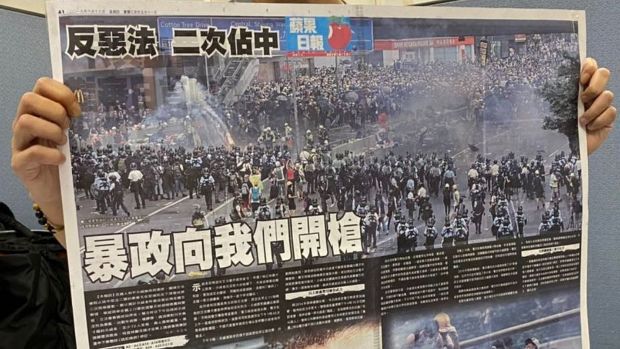Pro-democracy Hong Kong newspaper Apple Daily to shut down Thursday
By Joern Petring
HONG KONG – Hong Kong pro-democracy tabloid Apple Daily will shut down this week after a string of run-ins with Chinese authorities, it announced on Wednesday (23).
The newspaper, which was founded 26 years ago and has a circulation of around 80,000, said that the last issue would be published on Thursday (24) – two days earlier than initially communicated. The media company thanked readers for their loyal support.
On Monday (21), the paper had warned it was just days from shutting down after its assets were frozen in the wake of the arrest of five of its executives on suspicion of violating national security laws. Chief editor Ryan Law and publisher Cheung Kim-hung remain in detention.
Police say that they have found more than 30 Apple Daily articles that sought to convince foreign countries to impose sanctions on China and Hong Kong. This constitutes “conspiracy with foreign countries,” they say.
The European Union blamed Beijing for the closure of the news outlet, arguing that it was a sign of the repression of media freedom.
“The closure of Apple Daily’s Hong Kong operations clearly shows how the National Security Law imposed by Beijing is being used to stifle freedom of the press and the free expression of opinions,” foreign affairs spokesperson Nabila Massrali said in a statement.
“Its closing seriously undermines media freedom and pluralism, which are essential for any open and free society,” she said.
Reporters Without Borders (RSF), an organization that advocates for press freedom, also reacted with shock to the newspaper’s shutdown.
“By tearing down this symbol of press freedom, the Beijing regime is sending a chilling message to journalists around the world who refuse to relay its propaganda,” said Cedric Alviani, RSF East Asia bureau head.
“If the international community does not respond with the utmost determination, it will show to President Xi Jinping that he can erase press freedom in Hong Kong with complete impunity, as he has already done in the rest of China.”
Self-governing democracy Taiwan expressed its dismay at the newspaper’s closure late Wednesday.
The Mainland Affairs Council (MAC), the government agency on policy dealings with arch-rival Beijing, said the unfortunate episode rang the death knell for freedom of the press and free speech in Hong Kong.
“It also let the international community see that the authoritarian Chinese regime attacks dissidents by every means,” the council said, according to state-run Central News Agency.
The council said it regrets to see that media in Hong Kong, politically oppressed by the government in the name of the National Security Law, have eventually ceased operation.
Meanwhile, on social media, Taiwan Vice President Lai Ching-te also called on Beijing to stop oppressing the media in Hong Kong.
Chinese policy on Hong Kong has been the subject of intense focus for years. When China regained control of the city in 1997, it promised to allow democratic freedoms to continue for 50 years. Instead, it has tightened controls, often in reaction to protesters who had demanded even more democracy from Beijing.
The new Hong Kong security act targets the pro-democracy opposition and is aimed at activities that Beijing sees as subversive, separatist, terrorist or conspiratorial. In the view of critics, it serves to silence the opposition and cement the power of the Communist Party.
Apple Daily had already slimmed down as it became clear that its days were numbered. Numerous employees left the company. Then, shortly before the closure was announced, another journalist from the newspaper was arrested early on Wednesday.
The premises of the Apple Daily had been raided twice since August by several hundred police officers. At that time, newspaper founder Jimmy Lai was also arrested.
The 73-year-old is currently serving a 20-month prison sentence on charges of inciting unauthorized protests. He is also being investigated for alleged violations of the security law that Beijing introduced a year ago in response to ongoing mass demonstrations for more democracy in the Chinese Special Administrative Region.
-dpa


